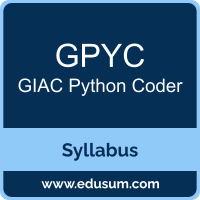 Use this quick start guide to collect all the information about GIAC GPYC Certification exam. This study guide provides a list of objectives and resources that will help you prepare for items on the GIAC Python Coder (GPYC) exam. The Sample Questions will help you identify the type and difficulty level of the questions and the Practice Exams will make you familiar with the format and environment of an exam. You should refer this guide carefully before attempting your actual GIAC Python Coder (GPYC) certification exam.
Use this quick start guide to collect all the information about GIAC GPYC Certification exam. This study guide provides a list of objectives and resources that will help you prepare for items on the GIAC Python Coder (GPYC) exam. The Sample Questions will help you identify the type and difficulty level of the questions and the Practice Exams will make you familiar with the format and environment of an exam. You should refer this guide carefully before attempting your actual GIAC Python Coder (GPYC) certification exam.
The GIAC GPYC certification is mainly targeted to those candidates who want to build their career in Offensive Operations domain. The GIAC Python Coder (GPYC) exam verifies that the candidate possesses the fundamental knowledge and proven skills in the area of GIAC GPYC.
GIAC GPYC Exam Summary:
| Exam Name | GIAC Python Coder (GPYC) |
| Exam Code | GPYC |
| Exam Price | $999 (USD) |
| Duration | 120 mins |
| Number of Questions | 75 |
| Passing Score | 67% |
| Books / Training | SEC573: Automating Information Security with Python |
| Schedule Exam | GIAC |
| Sample Questions | GIAC GPYC Sample Questions |
| Practice Exam | GIAC GPYC Certification Practice Exam |
GIAC GPYC Exam Syllabus Topics:
| Topic | Details |
|---|---|
| Control Structures and Iteration | - The candidate will be able to create and analyze simple control structures, including conditionals (if/else/elif) and for/while loops using Python. |
| Creation of Executables | - The candidate will have a basic understanding of creating a Python executable for Windows clients with a focus on penetration testing. This includes an understanding of backdoor functionality, the conversion of a Python program to an executable file, and using Python to create an executable that will evade most modern anti-virus signatures. |
| Data Analysis with Python | - The candidate will demonstrate the ability to use Python for various data analysis techniques including parsing binary data with the struct module, common file formats, log analysis and statistics with freq.py, counters and sets, long tail and short-tail analysis. |
| Data Structures | - The candidate will be able to create and manipulate variable types and data structures, including bytes, byte arrays, byte encoded unicode characters using UTF-8 and Latin-1, integers, Python 3 strings, sets and sequential data structures, including dictionaries, lists, and tuples. |
| Database Interaction | - The candidate will understand how to create a Python program to query databases using SQL libraries. |
| Exception Handling | - The candidate will have a basic understanding of Python exception handling capabilities, and how to build these into a program. |
| Functions, Classes and Objects | - The candidate will be able to demonstrate an understanding of Python functions, classes, and object oriented programming. |
| Network Interfaces | - The candidate will be able to implement TCP and UDP network based communications using Pythons socket module. |
| Packet Analysis with Python | - The candidate will understand how to use extended functionality of Python and Scapy to create, read, analyze, and manipulate captured network traffic. |
| Python Basics | - The candidate will be able to implement the more fundamental elements of Python, including creating, debugging and executing a program, and user/file input and output. |
| Regular Expressions | - The candidate will have a basic understanding of regular expressions, and how to implement them in searches with Python. |
| Website Interaction | - The candidate will understand how to use Python as a "browser" to interact with URLs and websites, handle cookies, and manipulate or capture traffic. |
To ensure success in GIAC GPYC certification exam, we recommend authorized training course, practice test and hands-on experience to prepare for GIAC Python Coder (GPYC) exam.
